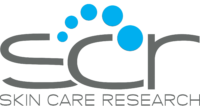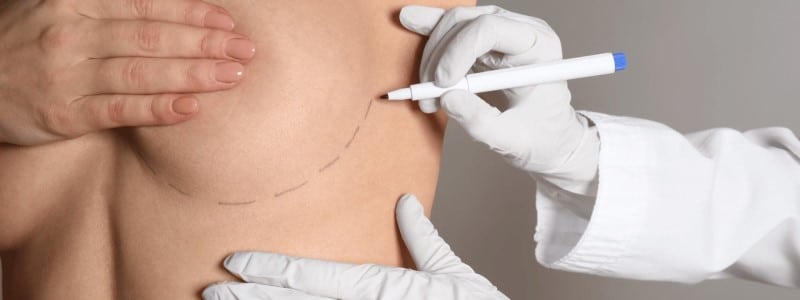This trial is currently closed for enrollment.

When the skin is injured, the body sends collagen to the area to help in the repair process. Though efficient in terms of production and delivery, the body is not good at immediately organizing the new collagen fibers that are laid down within and around a wound. If you’ve had breast surgery, you may have at least one relatively long incision. You may have multiple, and they may not have healed as well as you’d like.
At Skin Care Research, we are continually pressing forward into newer and better treatment techniques. Contact us at 786-673-5006 to learn more about our newest study for scar reduction following breast surgery. We have offices in Miami, Tampa, Hollywood, and Boca Raton, FL.
Who is a Candidate for Scar Reduction After Breast Surgery?
You may be a good candidate for scar reduction after breast surgery if your skin has not healed as well as you had expected. Perhaps your skin still looks raised and red. You may have developed contracted scars or keloid scars. Inefficient healing can appear in any number of ways. Provided that you are in good health and your surgical incisions have reached sufficient maturity to undergo further treatment, you should be a good candidate for some type of scar treatment. Our doctors are very careful in selecting appropriate candidates for our clinical trials. When you contact us, our team may ask you specific questions to determine the benefit of moving on to the next step in the intake process. We would be happy to hear from you!
What Are the Benefits of Scar Reduction After Breast Surgery?
There can be several benefits achieved through scar reduction treatment. Without visible scars, chances are you will feel better about your appearance. While breast surgery scars are largely hidden beneath clothing, you see them every time you dress and shower. If your scars are contracted or very poorly organized, you may notice them more than you notice the positive results of your surgical procedure. You may also gain more physical comfort, depending on the characteristics of your scars. Each situation is unique, so we must discuss our anticipated benefits on a case-by-case basis, which we do during our consultation.
What Are My Options for Scar Reduction?
Doctors perform a number of different techniques to help fade or reduce all types of scars. Some of the most modern professional scar treatments include:
- Dermabrasion, which removes the top layer of skin using a special “abrasion” instrument.
- Chemical peels, which accelerate cellular turnover using various chemical formulas that are left on the skin for a few minutes at a time.
- Collagen injections that help replace collagen that has been lost.
- Dermal filler injections, which can smooth certain types of scars.
- Cryosurgery, which freezes top layers of tissue to reduce the size and overall appearance of some scars.
- Steroid injections are sometimes used to treat hypertrophic and keloid scars.
- Laser resurfacing is occasionally used to treat hypertrophic scars.
- Grafts may be made to replace scarred skin.
- Surgical scar revision, which works by removing all or part of a scar and rejoining two new edges of skin. The new scar that forms should be less obvious than the first.
There are many existing scar treatment options to choose from. Our clinical trials test new technologies and techniques. These are explained during your consultation.
When Can I Opt-In for Scar Reduction After Breast Surgery?
Typically, doctors recommend beginning scar treatment at least two weeks after surgery. Early scar treatments are very conservative and are done to help your body naturally heal more efficiently. If you are interested in exploring our clinical trial, it may be necessary for your scars to have reached full maturity. This can take up to one year after surgery. That said, please do not hesitate to contact us for more information. Clinical trials are exploratory in nature, meaning we are seeking to learn more about how a certain treatment or treatments may work on various characteristics. Even if your scars are not fully mature, you may qualify for our trial.
How Can I Reduce My Chances of Scarring?
Scar formation is difficult to predict because it is partially influenced by your physiology, which is not within your control. That said, you can reduce your chances of poor scarring by choosing your plastic surgeon with the utmost care and asking questions about how they work to reduce the amount of scarring that occurs. Surgical technique matters, as do aftercare instructions. Your adherence to your surgeon’s instructions will also contribute to your overall healing. You may be advised to apply medication or ointment to your incisions after a certain time. You will likely be told to wear a special surgical garment to protect your incisions while they heal. Do not rush your recovery. Doing so could place unnecessary stress on your skin, resulting in scarring that is more noticeable than it needs to be. Once approved by your doctor, you may also begin applying silicon sheets to your incisions. This helps maintain tissue hydration, which facilitates healing. Finally, once approved by your doctor, you may gently massage your scars. Doing so increases blood circulation through the tissue and can also help break up lumps or hard tissue.
I Had an Infection After Surgery and Now I Have Terrible Scars. Can Anything Be Done About This?
Scars can develop for a number of different reasons. If you had an infection after surgery, your body’s strong immune response may have increased the amount of collagen that was produced, resulting in keloid or hypertrophic scarring. We may be able to help reduce the appearance of these scars. Contact us at 786-673-5006 for more information regarding our current clinical trial for scar reduction after breast surgery.
To learn more, fill out a form on this page or call 786-673-5006.
*NO COST. NO INSURANCE. MAY QUALIFY FOR COMPENSATION*

